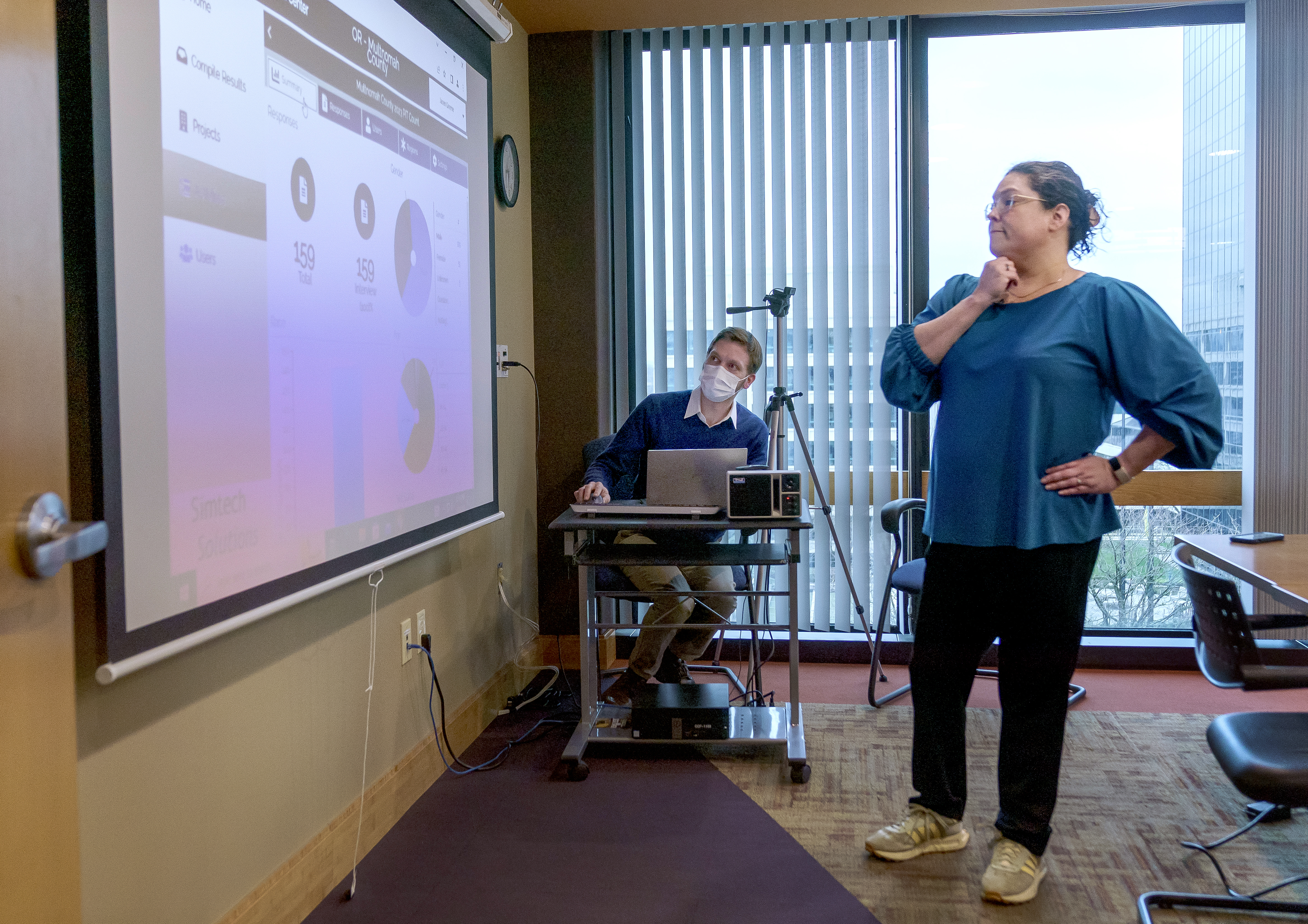
Jacen Greene, left, and Dr. Marisa Zapata look over Point in Time Count data at the regional Incident Command Center in Portland, Jan. 25, 2023. This year marks the first time that the region’s three counties will use a common analysis and methodology.
Kristyna Wentz-Graff / OPB
Every other year, local authorities travel through their jurisdictions counting people living under bridges, on the sidewalk or in public parks among other places.
It’s called the point-in-time count.
Multnomah, Washington and Clackamas county officials have worked together for years to try to increase the accuracy of the count. And this year, they’re trying something new: They’ll all use the same methodology and coordinate through the same organization, the Homelessness Research and Action Collaborative at Portland State University.
“HRAC is able to see a global, tri-county real time picture of where survey takers are going and doing their work,” said Denis Theriault, communications director for Multnomah County. “They can better adjust where folks are going to ensure areas aren’t missed.”
Every day and night through Tuesday, Jan. 31, surveyors will work to reach as many people experiencing homelessness as possible, asking them where they slept the night of Jan. 24. Authorities plan to match that count with records of services received — to make sure everyone is counted. Records will also be de-duplicated so no one is counted twice.

Over 400 surveyors will spread out in the tri-county area to get an accounting of the number of unhoused people in the area, many using a new phone app that allows information to be collected and shared in real-time.
Kristyna Wentz-Graff / OPB
Theriault said having counties collect data the same way will mean a more reliable regional count and more thorough regional coverage.
“This year’s Point in Time count reflects our values in creating a more comprehensive, data-driven response to this crisis,” said Multnomah County Chair Jessica Vega Pederson in a statement.
The collaboration coincides with calls from Vega Pederson to develop a regional Incident Command Center on homelessness and with Governor Tina Kotek’s announcement of a state of emergency.
Theriault said a similar effort last year helped identify hundreds more unhoused people.
Accuracy issues have affected the count in the past. Part of the issue is how the survey is set up. For example, someone sleeping on a friend’s couch isn’t included. Authorities say that means homeless people of color are under-represented as they’re statistically more likely to be doubling up with a friend. People staying in shelters are counted.
The count is also just a snapshot of one night. Experts point out that homelessness numbers ebb and flow significantly over time. So they say, the count isn’t a reliable way of learning how many people need services over the course of a whole year.
The count also relies on surveys where people are asked about delicate issues. Surveyors will ask people for demographic data like age, race, ethnicity, the length of time they’ve been homeless, whether they have a disability, and whether they are veterans or have experienced domestic violence. Some people may not be comfortable talking about their personal life with a stranger, so the survey is prone to human error.

Lori Kelley of Multnomah County's Joint Office of Homeless Services, left, project manager Carolyn Niehaus and Jacob Grigor, both of HRAC, look over data at the command center.
Kristyna Wentz-Graff / OPB
But for all its flaws, the bi-annual point-in-time count is important because without it, the federal government won’t distribute federal funds and grants meant to help states provide services to address homelessness.
“I am proud of the collaboration between counties as we strive to ensure the count captures the complex array of needs in our region,” said Washington County Chair Kathryn Harrington in a statement.
There is some concern that efforts to clean up Portland’s Old Town Chinatown before Lunar New Year celebrations might alter the count.
But Multnomah County’s Theriault said non-profit staff and government workers know who is homeless in most areas, “Someone’s impression, we couldn’t use for official purposes,” he said. “But folks do generally know where folks are, especially the outreach workers. They’re making the rounds. They’re seeing people. They know who’s there.”
Jacen Greene with Portland State’s homelessness research center said pandemic policies had affected last year’s count.
“I think at this point it’s really hard to know what the numbers will be coming out of the pandemic — with the end of say, emergency rental assistance and other programs like that,” Greene said.
The results of this point in time count are expected this Spring.

In this 2018 photo provided by Multnomah County, a surveyors talks with a man on the street talks with a man on the street during as part of the county's outreach program. Surveyors will spend the next week talking to as many unhoused people as possible to get an accurate picture of the homeless population in the tri-county area.
Courtesy of Multnomah County
Editors note: This story has been updated to reflect the correct spelling of Jacen Greene’s name.
